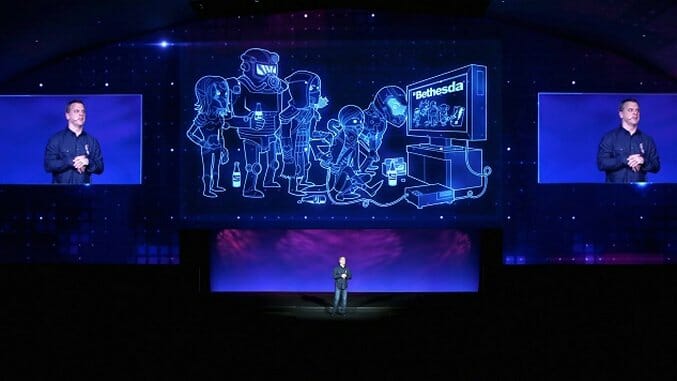E3 Press Conferences Are a Waste of Time
But the Show Itself Isn't
Photos by Jonathan Leibson / Getty Images Games Features
You’ve probably noticed that our games section has been drowning in posts about this year’s E3 trade show. Between press conference recaps, new trailers and screenshot galleries, we’ve pretty much been an all-E3 outpost for the last 24 hours, and that’ll continue for at least a few more days. I’m doing this all from home this year, and not being there in Los Angeles really underlines what makes E3 feel like such a massive waste of time. Those press conferences you watch on Twitch and then read hastily assembled recaps of a few minutes later? I can cover them much better from my office than I can from Los Angeles. These events no longer serve a useful purpose, and should be entirely replaced with online-only press briefings.
Nintendo isn’t a particularly forward-thinking company when it comes to how games are played and shared in the 21st century, but they’ve gotten one thing right: ditching a big E3 press conference for an internet stream is what every publisher should be doing in 2016. The traditional E3 press briefing, where thousands of journalists and retail buyers congregate in a theater to watch businessmen introduce ads and awkward speeches from game designers, is an archaic relic and a waste of time for every person in that room.
Before it became possible to stream these press conferences on the internet, they served a bit of purpose. They were previews of what the professionals in attendance could expect to see on the E3 show floor later in the week, and they also tried to set the tone for the media’s coverage of that publisher’s show. When the audience couldn’t follow along in real time at home, there was some value in journalists describing what happened at these press conferences. Whether good or bad, their opinions carried some weight with readers who weren’t able to watch along with them.
Now, though, everybody who’s interested is watching the press conferences can do so online at the same time as the people in the building. This is a good thing—journalists and game critics probably shouldn’t be opining too heavily on what are essentially commercials for games they haven’t played yet. They should try to avoid being complicit in the manufactured hype cycle of any game, as much as possible. And with the relatively recent ability to pump these press conferences out directly to the viewer, the publishers don’t even need the media to act as a middleman for that hype. They can let the fans get excited on their own, and also save some money in the process.
Right now the media is basically used as a television studio audience for these press conferences. They’re invited into those theaters with the hope that they will applaud and cheer at the right time. Unlike similar events in other entertainment industries, such as the television networks’ spring upfronts, which regularly have question and answer sessions between the press and the cast and creators of television shows, there’s hardly ever any opportunity to talk to game designers or executives at these press conferences. That happens later in the week, on the actual E3 show floor. It’s also rare for the media to be able to play any games at these press conference, with those opportunities also being reserved for the show floor during the actual convention (although that might be changing—both EA and Bethesda had playable demoes of certain games at their press briefings yesterday).
At this point the E3 press conferences are directed squarely and solely at the audience watching at home. The media and other people in the theaters are basically part of the show, clapping along as needed. Instead of renting out those large theaters, instead of risking a live demo or speech going awry, instead of asking for a few hours of time from the thousands of press and retail execs who attend these things in person, perhaps it’d be smarter for everybody involved if the publishers simply streamed a pretaped online press conference a day or two before the E3 show floor opens up? Maybe they’re afraid a pretaped show could lead to more leaks, but as this past week shows (and as the week leading up to E3 shows every year) leaks are going to happen no matter how hard they try to prevent them.
I’m not nearly as down on E3 overall as a lot of journalists I know. The actual convention itself has great value for anybody who writes about games—the publisher booths and appointments let writers actually sample games months before they’re released, letting us share opinions that aren’t quite as colored by the hype. A carefully prepared demo is a form of a commercial, sure, but it’s harder to hide what a game actually is once it’s playable, and it’s harder to shape our response to a playable demo than to an ad. It can still be too hard to actually talk to some game designers, especially for the biggest games, and publishers should maybe turn down the volume and bombast on the floor a bit (although that’s what the meeting rooms are for), but otherwise E3 is an important convention for anybody who makes a living from making, selling or writing about games.
Those press conferences, though, need to go. Instead of giant pep rallies in old theaters, companies should just stream out an hour-long look at their upcoming portfolio directly to the consumer. Everybody would be better for it, from the writers to the readers to the game designers and their executives. As it is, it’s pretty ridiculous that I can do a better job covering these events from my own home than the writers in attendance can.
This originally ran on June 13, 2016.
Garrett Martin edits Paste’s games and comedy sections. He’s on Twitter @grmartin.